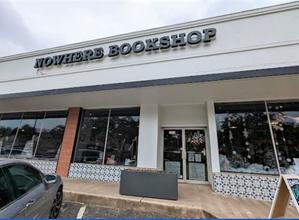The Houston Chronicle spoke with two Texas booksellers about the potential effect of HB 900, the bill that has passed the House and Senate and will likely be signed soon by Gov. Greg Abbott. Both Valerie Koehler, owner of Blue Willow Bookshop, Houston, and Elizabeth Jordan, general manager of Nowhere Bookshop in San Antonio, said that the bill was unworkable for bookstores.
 If the measure becomes law, all companies selling to school libraries, librarians, and teachers in Texas, would have to assign ratings to books "based on the presence of depictions or references to sex," the Texas Tribune wrote. "A book would get a 'sexually relevant' rating if the material describes or portrays sexual activity and is part of the required school curriculum. A book would get a 'sexually explicit' rating if the material describing or portraying sexual behavior is 'patently offensive' and not part of required curriculum. State law defines 'patently offensive' as materials that are an affront to 'current community standards of decency.' "
If the measure becomes law, all companies selling to school libraries, librarians, and teachers in Texas, would have to assign ratings to books "based on the presence of depictions or references to sex," the Texas Tribune wrote. "A book would get a 'sexually relevant' rating if the material describes or portrays sexual activity and is part of the required school curriculum. A book would get a 'sexually explicit' rating if the material describing or portraying sexual behavior is 'patently offensive' and not part of required curriculum. State law defines 'patently offensive' as materials that are an affront to 'current community standards of decency.' "
The bill has a retroactive effect: by next April, all booksellers must submit to the Texas Education Agency a list of every book they've ever sold to a teacher, librarian, or school that qualifies for a sexual rating and is in active use. The stores also are required to issue recalls for any sexually explicit books. If the Agency finds that a bookstore has been incorrectly rating books, it can be banned from doing business with charter schools or school districts.
The Chronicle noted that "owners and employees of bookstores around the state have said they don't have the staff or expertise to read and rate every single book they are selling to an educator, and they have no records to retroactively rate every book they've ever sold to a school."
Koehler told the Chronicle, "The First Amendment person in me says, 'Why do we have to mark the books at all?' The business person in me says, 'That's going to be very hard to administer for the middle vendor,' which we are."
She added: "The way the bill is written right now is that not only can we get in trouble for what we sell to a school, we can get in trouble for something we sold 10 years ago to a school."

"I think that the ultimate end result is there's just going to be a lot fewer books in school libraries because there are going to be fewer bookstores willing to do the work to sell those books, and that's bad for all Texas students."
Jordan noted, too, "I'm a relatively new store, but even I don't have records of the books I've sold to libraries in the three to four years I've been active."
Observing that "many have expressed concerns that the bill is an effort to restrict books with LGBTQ themes or by Black authors," the Chronicle recalled that Rep. Jared Patterson, author of the measure, has said the bill was a reaction to Gender Queer by Maia Kobabe, one of main targets of the current wave of book bannings across the country.
Sen. Angela Paxton, who shepherded the bill through the Senate, said, "We're not talking about a certain type of sexual activity. We're talking about sexually explicit of any sort. It doesn't belong in front of the eyes and in the minds of kids."
She asserted that the bill will "mostly affect large vendors," the Chronicle wrote, "as just 50 companies sell most books purchased by Texas public schools, and three giants are responsible for the bulk of titles in campus libraries."
"If vendors want to sell books in Texas, they certainly have a vested interest in making sure it's done properly," she continued.

